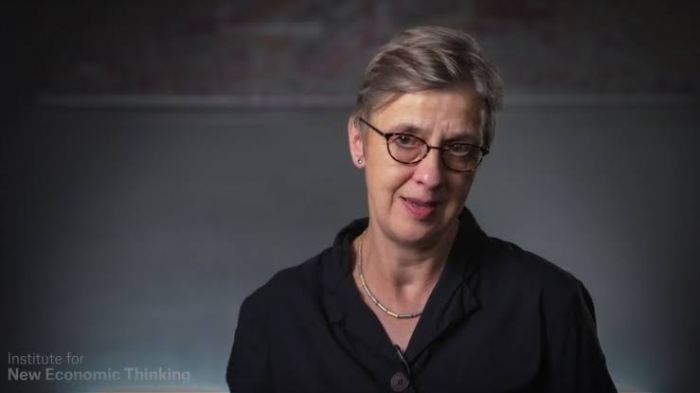This US election marks what Germans call a Zeitenwende (“turning point”). Voters are signaling clearly that they want change, preferring a second Donald Trump administration to another caretaker government presiding over a regime that they reject.
True, political parties that promised to protect the status quo have lost elections in country after country this year. But the significance of voters in the world’s oldest democracy rejecting their country’s constitutional foundations – the rule of law, an independent and impartial judiciary, due process, and an orderly transfer of power – can hardly be overestimated.
The blame game started before the election results had sunk in, with a predictable focus on elitism, identity, and the losing candidate herself. This cycle of recrimination will tear apart the Democratic Party and render it even less fit for governing in the future. It also will distract from the elephant in the room: capitalism. Democracy is in a death spiral because it is subject to a socioeconomic regime that pits everyone against everyone else, undermining the capacity for consensus and collective decision-making.
It is not the first time that capitalism has upended democracy. A century ago, the effects of rapid industrialization at the expense of individuals and their communities fueled communism and fascism in Europe. Writing during World War II, the economic historian Karl Polanyi traced the root cause of his era’s political upheavals to an economic system that subordinated society to the market principle.
The problem, according to Polanyi, started with the abolition of the “poor laws” in England in the early nineteenth century. Uprooted, landless masses had no choice but to migrate to cities, where they were exploited as cheap labor in factories that consumed their lives and those of their children. While this system undoubtedly generated prosperity, it came at enormous costs to too many people. Without the devastation brought by World War I, the backlash against it by the masses might have taken much longer.
The United States, which fought in WWI but not on its own territory, largely avoided the backlash despite the economic depression of the 1930s. Importantly, President Franklin D. Roosevelt’s administration accomplished something that other countries did not: It gave the American people enough economic security that they could begin to envision a better future for themselves and their families.
This time is different, and not only in the US. We live in a system that most politicians have declared to be without alternative. In fact, they themselves have long surrendered control of the system and lack the capacity or will to imagine a different one. The late Fredric Jameson’s aphorism that “it is easier to imagine the end of the world than the end of capitalism” has gained renewed currency, and it is not hard to see why. Governments have very little room for maneuver, lest they be punished by (utterly amoral) financial markets. Long celebrated as a tool for disciplining policymakers, financial globalization has placed the fate of entire societies in the hands of investors who care only about price signals and are oblivious to human needs.
Governments tied their own hands in the hope that markets would deliver capital, goods, and jobs. Buying into the belief that they should get out of the market’s way, they opened their countries to free capital flows, even as they supported the selective legal coding of assets and intermediaries to benefit the well-heeled. Later, they encouraged their central banks to bail out intermediaries who threatened to bring down the entire financial system in yet another crisis.
Countries also adopted international treaties that gave multinational corporations the power to sue host states for harming the profitability of their investments, or for “unfair and inequitable” treatment. With these cases overseen by an arbitral tribunal located elsewhere, governments effectively disarmed their own courts and undermined their own constitutions (whose provisions cannot be used as a defense against violations of international treaties).
Some countries (Germany most prominently) went so far as to deny future elected governments the option of raising additional debt finance, by enshrining balanced-budget requirements in their constitutions. Others held their people on a short leash by pursuing fiscal austerity, even as the rich thrived on yet another asset boom supported by easy monetary policies. Like Odysseus, who had his hands bound to the ship’s mast to withstand the call of the sirens, governments found ways to escape the call of the voters who had elected them. Democratic self-governance lost credibility long before the rise of the anti-democratic parties that now openly deride it.
For his part, Polanyi expected the war to be followed by another transformation that would put society, and not markets, in control. The legal and institutional mechanisms adopted to advance this goal did work initially, but powerful private actors and their lawyers soon found ways to arbitrage around them.
Two decades after the war, what the University of Michigan’s Greta Krippner describes as the financialization of the American economy had already taken off. Financial returns became the end to which all other needs and aspirations were subordinated. While the collateral damage of this process was widespread, the biggest blow was dealt to our capacity for collective decision-making.
Had communism and socialism not collapsed at the very moment when financialization unleashed its full force, many might have noticed its corrosive effects on democracy much earlier. Instead, capitalism was celebrated as the only game in town. As a result, we did not witness the “end of history” that Francis Fukuyama proclaimed when the Cold War wound down. We are condemned to relive it, but whether as tragedy or farce remains to be seen.
Project Syndicate


































































